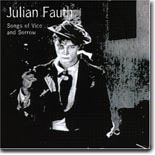|
Julian Fauth
Songs of Vice and Sorrow
Electro-Fi Records |

Electro-Fi Records tends to focus on the more established and matured
artists of the genre. Snooky Pryor, Finis Tasby, Sam Myers, and Willie
“Big Eyes” Smith immediately come to mind when you mention the label’s
name.
Julian Fauth is one of their newest artists. Getting the nod to
join the outstanding roster is testament to his magnificent talent. The
respected record company considers Fauth, “the most strikingly original
young singer/songwriter.”
He is known to perform non-stop for several
hours, so it is not surprising Songs of Vice and Sorrow is 74 minutes. The 16 songs'
dreary topics (murder, robbery, drugs, gangs, and prostitution) aren’t
anything you won’t see/hear on the evening news or prime time
television. Thus, the album has been named appropriately.
Fauth’s lyrics tell engrossing stories. Like a dramatic movie or
long-running soap opera, you get absorbed in them. In fact, the lyrics
are so lifelike, you’ll think he must have lived the lifestyles that he
sings about. "Cobalt" features Fauth’s alternative and forward-thinking
guitar combined with intense lyrics about hoboing on the Grand Pacific
Train.
Like a thief in the night, the piano darts away on "Running." Here,
Paul Reddick’s harp is haunting. It is mystical how much music can be
made by two gifted musicians. On "Big Brazos," his harp is moody and, like
the song’s lyrics, a bit dark. Reddick’s harp is the featured instrument
on "Highway 61," which includes a full band.
David Rotunto blows his harp
with soul, injecting energy to "Red Richard." "Suicide Note" explicitly
depicts the mental state of mind before and during the act. On "When My
Mother Died,"
Mel Brown’s blues guitar tone is authentic, but its effect
– like Fauth’s fantastic piano – is bittersweet. The sad song is a
tragic emotional rollercoaster ride, which tells a woeful tale that ends
with a hopeful dream. A stronger instrumentalist than vocalist, Fauth’s
warm voice is at its liveliest on the only cover song, J.B. Lenoir’s
"Mojo Boogie."
The reputable personnel also includes Al Lerman (harp),
Wayne Charles (harp), Bob Vespaziani (drums), Sam Petite (bass) and Alec
Fraser (bass).
Essentially this is an acoustic disc, but it is not stereotypical Delta
blues. “I play good clean barrelhouse blues,” says the young prince of
the keyboards. Time and time again, he creates stunning melodies. You
won’t tire of him or them.
On this CD, you’ll hear distinctive American
sounds by one of Canada’s brightest new artists. Along a journey from
the finest rehearsal hall to the roughest juke joint, Fauth’s old-time
New Orleans piano rocks like a bed in a brothel, while his lyrics are
filled with the pain and misery that bore the genre. A modern day
mastermind on piano, Fauth is retro and progressive at the same time.
Julian Fauth is a very interesting, inspiring, and talented new find.
His graphic lyrics may not leave you feeling well, but his novel music
will. Just like Fauth, your feet will be stomping.
--- Tim Holek